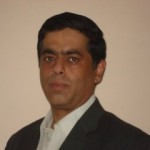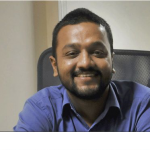How G-Cube Started
Manish Gupta Co-Founded G-Cube along with Kapil Gupta and Sayan Guha in their final year at Kurukshetra Engineering College. The startup was funded by taking small loans from families, and insights were provided from all entrepreneur acquaintances. Initially, the founders nurtured the idea of starting an online trading portal. They tried to partner with NSE but found that this kind of portal would need high budget and a high-end technology to get the data stream and deliver it online to users. After a few weeks of research and development they dropped the idea and hunted for some more blue waters.
Incidental Entry into e-Learning Space
Not disheartened with the failure of initial idea, they started the way most of startups work – picking up whatever work is available according to organization’s skill set – usually small software development projects. This hunt & peck led them to a big game – a large organization into Learning Management. The organization wanted to develop a Virtual Learning Platform.
Working a few months on this project – they found that only a few organizations in India were focusing purely on learning technology and they immediately identified their path ahead. They determined to make their mark in the corporate education space. Tasting first success, they hunted for more projects in Content Development, LMS development and built a good muscle in the e-learning space.
After several projects, they figured out that the market lacked a standard learning technology platform to fulfill the market need. They went to market and did extensive research about the LMS landscape. A few angel customers gave them insights and specifications to build the LMS. Thus a base learning technology platform was build. The further research on customer needs, automation levels in learning technology, specifications of the competing products and future outlook helped them chalk out the product growth map for the coming months.
Even before the product roadmap was complete, they successfully sold the product (and the vision) to several education institutes and L&D departments of large enterprises. Two of the first few customers for the product were a large general insurance company and one of India’s largest publisher. The acquisition of these key customers helped the development team face challenges and list of features that they had not visualized. Within one to two years a robust learning platform based on real time customer inputs was developed. The architecture thus developed was dynamic and could accommodate the wide range of customers – each having some unique needs. In this way a small step lead to development of a complete learning suite, which was later named WiZDOM LMS.
Selling for success during infancy
With all technology in mind and little sales experience, Manish and team used to cold call as a primary mode to find prospects and fix meetings. Manish recalls using all personal and network contacts (and several other industry sources) to procure leads to meet potential buyers in the market. They picked up any size or kind of project that was offered just to develop capabilities and to stay above water.
Only after a few years of work, they got a hang of the e-learning market. Then they redefined their capabilities, re-build the product, segmented the market and started focusing on the more qualified organizations. The sales process got smart – equipped with necessary sales collaterals like physical and electronic brochure for better presentation of product demo in their feet on street sales model.
First Customers Sales Closure
The first customer closure is still one of the most interesting stories of Manish. While cold calling as usually, they incidentally called one of the largest education provider in the country and landed into the extension of the Sr. Vice President. After a couple of minutes on the phone, the executive insisted that they do not outsource. Manish did not give up and was persistent. He asked for the email id and phone number and immediately emailed a brochure to the executive. Since the founders came from an engineering background, the brochure was highly technical in nature and nowhere near a good marketing communications document. Consequently, the brochure did not get any response from the prospect. However, this did not deter Manish to give up efforts. Impressed with the persistent follow-up, Sr. VP introduced them to another personwithin the organization. G-Cube team met this new contact VP and did another round of presentation. While this new contact could see the potential in team G-Cube, he had doubts whether these kids could build a serious application like Learning Management tool. But the confident presentation and the never-say-dies attitude of the founders impressed him personally and he made up his mind to give them a chance. Manish and team seized the moment, conducted all necessary research on the domain, created a sample program and sent the proposal. The client was amazed with the depth of knowledge embedded in the proposal. The sample program sent along with the proposal was too close to the system the decision makers wanted; and thus they were almost sold to the idea. Although, there were lots of apprehensions because this was a key project for them but the dedication of the G-cube team and the amount of hard work put in at proposal stage boosted their confidence. Additionally, the price that was quoted to build the system was fairly low for the customer – significantly lower than building an in-house capacity of developers. G-Cube folks sounded right and were willing to put in any number of hours at a great price. The client took the risk and G-Cube bagged its first closure.
Could it have been better?
Manish agrees that they could have done better.
Manish remembers that in their early days they were not very well organized and did not have much idea on what exactly they wanted to sell and how. Their presentations were not polished, the sales pitch was too technical and very rarely talked about problems they would solve for the customers.
These sales mistakes cost them lots of business, especially in the days when there was little competition. Today, G-Cube is highly matured and talks the language of the customers and use only necessary technology in their sales pitch. Manish said that he has realized that people hardly care about the technology, whether it is based on .Net or Java or anything else; they look only for a solution that can solve their business problem. Initially, Manish and his co-founders did not focus on developing a sales team. Founder team lead the sales initiative and hired only technology people. This was a mistake that startups should avoid. Manish said that it made sense to sell in the beginning only as they did not have necessary funds or a real product. However, he realizes that he should have hired a sales team to scale faster because sales has to come first and technology can always come in later. Now Manish spends substantial energy in hiring right person at the right time for the sales team.
Manish’s Advice to early stage entrepreneurs
The entrepreneurship journey is very unpredictable. Not all strategies work as planned. Some ideas will not work at all. The only thing consistent for an entrepreneur is the change. Hundreds of Multi-Billion dollar organizations have changed a lot based on the market. He has learnt that persistence is the only thing that will help in addition to being confident and being patient.
G-Cube today
G-cube has now grown up to 250 permanent staff and around 50 contractors. They serve more than 200 customers ranging from large enterprises to Small and Medium Enterprises. The impressive list includes 30+ Fortune 500 companies. Their product WiZDOM has been named among the best LMS across the world. Fortune Magazine India has rated the founding team with 40 under 40 in 2014. They have also been featured in the Top 10 e-learning Movers and Shakers by Bob Little Press & PR which is the equivalent of Oscar in the e-learning space. G-Cube has won more than 50 awards, many during the last five years. They have also won the Deloitte Fastest 50 India award for 4 consecutive years and fastest in Asia for the last 6 years. Surprisingly, G-Cube has never raised funds and has grown organically through internal cash accruals.






